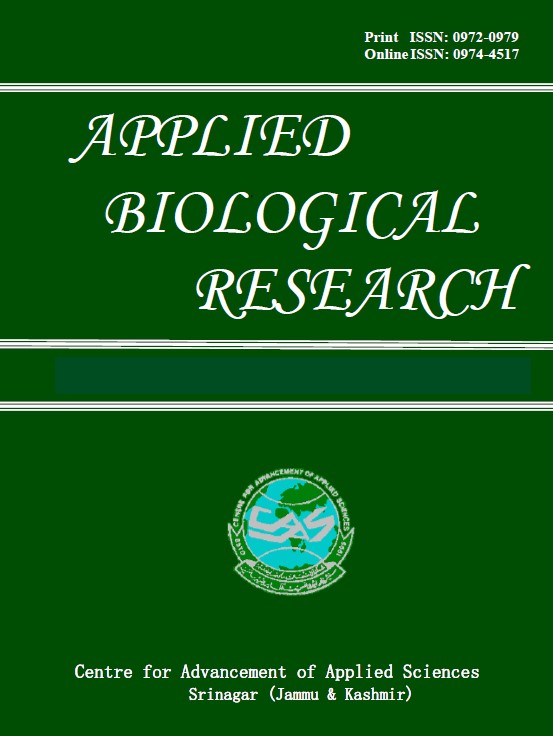Genetic Variability In Physico-Chemical And Morphological Traits Among Sandy Pear (Pyrus Pyrifolia Nakai.) Genotypes In North-Western Himalaya
DOI:
https://doi.org/10.48165/Keywords:
Clusters, correlation, genetic variability, sandy pear, yieldAbstract
The study was aimed to assess the genetic diversity in sandy pear (Pyrus pyrifolia Nakai.) of North-Western Himalayan state of Jammu & Kashmir (India) and to explore and characterize the available genotypes using morphological traits. The genetic variability of 30 sandy pear genotypes collected from the 3 districts of Kashmir were evaluated for various qualitative and quantitative traits. The genotypes showed a considerable genetic diversity and differed significantly for traits like tree, leaf, flower, fruit and yield characters. Fruit weight, fruit firmness, total soluble solids, acidity, juiciness, total sugars, yield and yield efficiency ranged from 21.7-200.4 g, 5.3-9.79 kg cm-2, 9.2-17.0oB, 0.11-0.46%, 32.88-84.05%, 4.50-11.15%, 10.0-805.0 kg tree-1and 0.14-1.72 kg cm-2, respectively, with respective mean values of 68.7±0.78 g, 7.52±0.03 kg cm-2, 12.93±0.08oB, 0.23±0.01%, 64.65 ±0.1%, 7.64±0.06, 177.56±0.46 kg tree-1and 0.57±0.004 kg cm-2. The coefficient of variation was highest for fruit diameter (15.58%), followed by fruit length (10.87%) and lowest for juice content (0.28%), followed by yield (0.45%). Fruit diameter showed a significant positive correlation with fruit length and fruit weight butnegative correlation of fruit diameter was observed with TSS, acidity and sugars. Yield of sandy pear genotypes had positive correlation with yield efficiency.
Downloads
References
Ahmed, M. 2008. Biodiversity in Pears (Pyrus spp.): Characterization and Conservation of Germplasm from Azad Jammu and Kashmir. Ph.D. thesis. Department of Horticulture University, College of Agriculture, Bahauddin Zakariya University, Multan, Pakistan.
Ahmed, M., Anjum, M.A., Shinwari, K.Z., Awan, M.S. and Rabbani, M.A. 2011. Assessment of fruit quality parameters of Pyrus germplasm collected from Azad Jammu and Kashmir (Pakistan). Pakistan Journal of Botany, 43(2): 971-981.
AOAC. 2000. Official Methods of Analysis (15th edn.). Association of Official Analytical Chemists. Washington, USA.
Bennett, E. 1965. Plant introduction and genetic conservation: Genecological aspects of an urgent world problem. Scottish Plant Breeding Station Records, pp. 27-113.
Bhat, Z.A. 2012. Molecular Characterization and Hybridization Studies in Pear. Ph.D. Thesis, Division of Pomology, Punjab Agriculture University, Ludhiana, Punjab, India. Bhat, Z.A. and Dhillon, W.S. 2015. Genetic studies on variability, heritability, genetic advance and cluster analysis in pear (Pyrus spp.). Indian Journal of Horticulture, 72: 167-172. Doyon, G., Gaudreau, G., St. Gelais, D., Beaulieu, Y. and Randall, C.J. 1991. Simultaneous HPLC determination of organic acids, sugars and alcohols. Canadian Institute of Science and Technology Journal, 24: 87-94.
Elshihy, O.M., Sharaf, A.N. and Muzher, B.M. 2004. Morphological, anatomical and biochemical characterization of Syrian pear (Pyrus syriaca Boiss) genotypes. Arabian Journal of Biotechnology, 7: 209-218.
Erez, A. and Flore, J.A. 1986. The quantitative effect of solar radiation on “Red haven” peach fruit skin colour. HortScience, 21: 1424-1426.
Glaszmann, J.C. 1990. Genetic divergence among cold tolerant rice’s (Oryza sativa L.). Euphytica, 45: 95-104.
Kumar A., Bist, L.D. and Avasthe, R.K. 2010. Germplasm evaluation of low chill pears (Pyrus spp.) for vegetative, reproductive and fruit quality parameters in Tarai area of Uttarakhand. Indian Journal of Plant Genetic Resources, 23: 13-17.
Marini, R.P., Sowers, D. and Marini, M.C. 1991. Peach fruit quality is affected by shade during final swell of fruit growth. Journal of the American Society for Horticultural Science, 116: 383-389.
Paganova, V. 2003. Taxonomical reliability of leaf and fruit morphological characteristic of the Pyrus L. taxa in Slovakia. HortScience, 3: 98-107.
Rana, J.C., Chahota, R.K., Sharma, V., Rana, M. and Verma, N., Verma B. and Sharma, T.R. 2015. Genetic diversity and structure of Pyrus genotypes of Indian Himalayan region based on morphological and SSR markers. Tree Genetics and Genomes, 11: 821.
Aarifa Jan et al.
Rangana, S. 1995. Handbook of Analysis and Quality Control for Fruit and Vegetable Products (3rd edn.). Tata McGraw Hill Publishing Co., New Delhi, India.
Rao, T.P. and Gomathinayagam, P. 1997. Genetic diversity in semi-dry rice under different environments. Madras Agricultural Journal, 84: 314-317.
Reighard, G.L., Ouellette, D.R. and Brock, K.H. 2008. Field performance of Asian pear cultivars in South Carolina. Acta Horticulturae, 800: 315-318.
Sandhu, A.S., Singh, T. and Singh, R. and Dhillon, W.S. 2007. Evaluation of oriental pear germplasm under subtropical conditions. Indian Journal of Horticulture, 64: 127-130. Sardana, S., Borthakur, D.N. and Lakhanpal, T.N. 1997. Genetic divergence in rice germplasm of Tripura. Oryza, 34: 201-208.
Shyamali, G.G.V. 2006. Fruit Development Studies in Some Asian Soft Pear Varieties. M.Sc. Thesis Punjab Agriculture University, Ludhiana, Punjab, India.
Singh, B. 2006. Vegetative and Fruiting Behaviour of Hard Pear Strains in Relation to Nutrient Status. Ph.D. dissertation, Punjab Agriculture University, Ludhiana, Punjab, India. Singh, R.K. and Chaudhary, B.O. 1977. Biometrical Methods in Quantitative Genetic Analysis. Kalyani Publishers, New Delhi, India.
Singh, T. 2002. Vegetative and Fruiting Behaviour of Semi-soft Pear Strains in Relation to Nutrient Status. Ph.D. thesis, Punjab Agriculture University, Ludhiana, Punjab, India. UPOV. 2000. Pear (Fruit Varieties) UPOV Code: PYRUS-SPP (Pyrus pyrifolia Nakai.) – Guidelines for the Conduct of Tests for Distinctness, Uniformity and Stability. TG/14/9. International Union for the Protection of New Varieties of Plants, Geneva, Switzerland. Verma, M.K., Lal, S., Mir, J.I., Bhat, H.A. and Sheikh, M.A. 2014. Genetic variability among ‘Kashmiri Nakh’ pear (Pyrus pyrifolia): A local variety grown in North Western Himalayan region of India. African Journal of Biotechnology, 33: 3352-3359.
Verma, V.D., Pradeep, K., Yaday, S.K., Rana, J.C., Chander, R. 2006. Evaluation of pears (Pyrus spp.) germplasm under temperate region of Himachal Pradesh. Indian Journal of Plant Genetic Resources, 19: 96-99.

